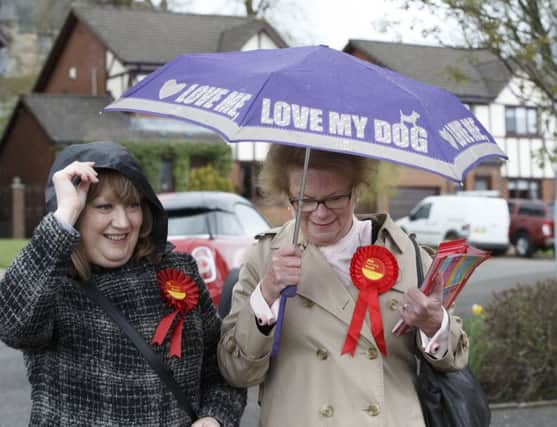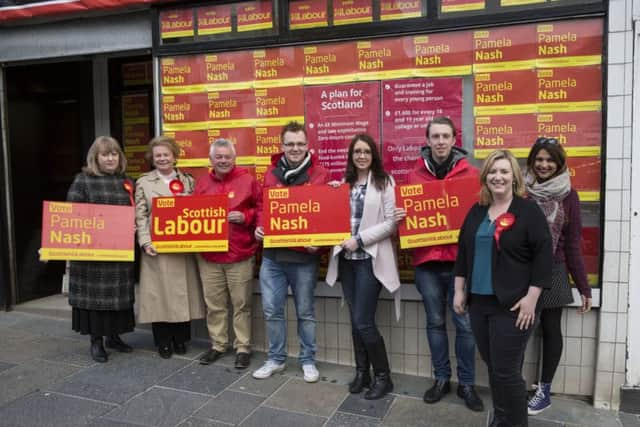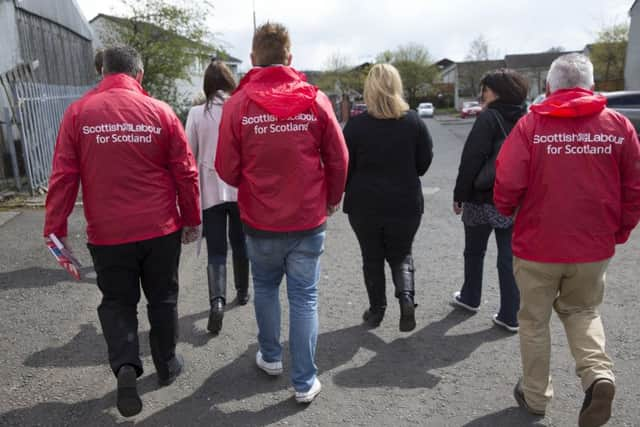Dani Garavelli: Labour in denial about landslide


IT’S the day before May Day, the most important event in the socialist calendar. At the Labour campaign office in Airdrie a diverse bunch of canvassers is preparing to go out and knock on doors. A former industrial town, powered by steel and iron, its residents could once have been counted on to put their cross beside the red rose, regardless of the quality of the candidate, but Scottish Labour is in decline and every fresh poll brings a worse prognosis.
The canvassers have been treading the streets day in, day out, trying to resuscitate its fortunes. “In the last week, we have been sunburned, hit in the face with hail and blown off our feet,” says Pamela Nash, who became the constituency’s MP with a 12,408 majority in 2010. Notwithstanding their efforts, the latest Ashcroft poll showed a clean sweep for the SNP and Scottish Labour flat-lining.
Advertisement
Hide AdAdvertisement
Hide AdBy rights, the convoy of cars which leaves for Staffa Drive should have all the gaiety of a cortège, the dozen or so campaigners who step on to the street, all the buoyancy of the newly bereaved. And yet they manage to remain upbeat, despite the news reports, despite the rain, despite the “Red Tory” graffiti they pass on the way.


Leading the posse are Nash, the UK’s youngest MP, and Baroness Liddell of Coatdyke, Labour grandee and one of Nash’s predecessors in Airdrie and Shotts. Though Nash struggled to retain her candidature after complaints about her profile and performance, she has an air of irrepressibility which filters down to the rest of the team. Helen Liddell is wearing Liquorice Allsorts cuff-links and carrying a Love Me, Love My Dog umbrella, yet somehow retains a dignity and commanding presence that recalls Labour’s past glories. Following behind is a mix of paid party workers and volunteers, like Martin McCulloch, who is newly unemployed and has been “bitten by the doorstep bug”. Without a flicker of self-doubt, they swoop on houses they have marked down as Don’t Knows. “Remember, if anyone wants a poster for their windows, there are plenty in the cars,” shouts organiser Pearleen Sangha hopefully.
So what – aside from an apparently limitless supply of Midget Gems – is keeping these Labour supporters cheerful in the face of impending doom? Are they deluded or in denial or is there still just a sliver of a chance that the pollsters are indeed over-stating the scale of the disaster? McCulloch says it’s the reaction they are getting on the doorsteps that makes it all worthwhile. “We are being very well-received,” he says. “And we know that 30 per cent of voters are still undecided – this is our chance to persuade them that voting Labour is the right thing to do.”
This mismatch between the polls and personal experience is something that is mentioned by all the campaigners I meet in Airdrie and in Paisley and Renfrewshire South, where shadow foreign secretary Douglas Alexander could soon be deposed by 20-year-old student Mhairi Black.
“The polls are predicting a massive landslide with the SNP taking every single seat,” says taxi driver Michael McBride. “If that was transferred to when we are out, then we would be getting a negative response at every second house and we’re not. Yes, there are people who support the SNP, but I am hearing the opposite from lots of others who are concerned about the division in our country. And, with our 10-point plan, we really do have something to offer them.”


Perhaps the undecideds are being won over by promises to end exploitative zero hours contracts and bring in a 50p tax rate, but it is also possible the canvassers are viewing the world through a filter of desperation. Their invasion of Staffa Drive is greeted by a cacophony of barking; dogs seem to pour out of every house and stand yapping at gates, but the people inside are less intimidating; there is no slamming of doors or shouting abuse. Rather they smile and chat noncommittally. A few have gripes they want to share. But I don’t hear anyone ask for a poster.
Any hint of positivity is grasped with the ferocity of a man with a hangover who is afraid of losing his Irn Bru. One householder says he thinks the coalition have done a good job over the past five years. “But did you hear the last thing he said?” presses McCulloch. “He said he’d probably vote Labour.”
Later on, I come back to the street in the absence of the canvassers to test out what people really think. “I’m SNP – everyone round here is SNP,” says a man with a Celtic tattoo. A few doors up, a woman says she plans to stick with Labour after talking to Nash but fears she is in the minority. “People I never thought would vote SNP are voting SNP. I opened the newspaper today and saw all of Scotland coloured yellow and I thought: ‘Am I missing something here?’”
Advertisement
Hide AdAdvertisement
Hide AdHer bewilderment is echoed by Labour supporters across Scotland; ask them about the apparently unstoppable march of the SNP and they express an inchoate fear. Some use words such as “mania” or “madness” to describe the groundswell of SNP support that has swept thousands of former Labour voters along with it.
For those who have defected, the explanation is simple: Labour deserted the working classes and is reaping what it has sown. But those who continue to vote for the party hold to a different truth: for them, the SNP has performed a sleight of hand, passing itself off as progressive (while freezing the council tax) and somehow avoiding blame for current problems, despite having been in power for eight years. Those who have kept the faith with Labour have been vilified as sell-outs, but there is something touching, even noble, about these people whose history and convictions lead them to beat on, boats against the current.
For much of the 20th century, Airdrie was a typical working class Scottish town, with factories such as Boots, Banner Textiles and Pye providing most of the employment. Yet despite its macho image, Airdrie and Shotts has been represented by more female MPs than any other constituency, including some giants of the Labour movement: Jenny Lee, who founded the Open University, Peggy Herbison and Liddell herself. In 2015, it remains a typical Scottish town: full of betting shops, charity shops, pound shops and shops with To Let signs in the window.
In places like this, there will always be people who vote Labour out of blind loyalty. But for most, the motivations are more complex; a lingering resentment over the referendum and the way it has polarised Scotland; a nostalgia for what the party once represented; an honest belief that, for all its faults, Labour is still best-placed to deliver equality to society’s most underprivileged.
At the campaign office, retired primary teacher Adeline Hughes, has popped in to pick up some stickers. In the run-up to the referendum, she turned her wheelchair into a No-mobile by attaching a placard to the back of it. “A neighbour fixed it on so tight, I couldn’t get it off when I went to church and had to wrap a cape round it to hide it,” she laughs. Hughes joined the Labour Party in 1976 after Shirley Williams urged people not to sit on the fence. A long-standing activist, she was beginning to get weary when the triumphalism of Yes voters galvanised her into action.
But it’s not only those who remember the Labour Party back in its heyday who are attracted to it. Jed Graham, 21, finished the last of his university exams a couple of weeks ago and has been out campaigning ever since. His mother is a social worker, his father a Tory-voting businessman, and his support for Labour is, he says, the product of the clash between their very different perspectives.
Just three years old when Blair came into power, Graham is too young to have felt betrayed by the party’s move to the right, or the Iraq War, but he volunteers at a local food bank, sees first-hand the results of benefits sanctioning and is pleased Miliband seems to be putting social justice issues back at the forefront of the party’s agenda.
A 40-minute drive away, in Paisley, Labour voter Michael Clayton is playing a piece of classical music on his handmade guitar as a gardener weeds his borders. Living in the bottom half of a beautiful sandstone house, he is the embodiment of the equality of opportunity and social mobility the Labour Party once stood for. Clayton was born in a two-up two-down in Liverpool, one of 12 children, only six of whom lived. When he was two, he was on the brink of death himself. A doctor told his mother there was nothing he could do, then charged her half a crown. “Because of this, I believe in the NHS above all things,” he says.
Advertisement
Hide AdAdvertisement
Hide AdDespite leaving school at 15, Clayton prospered; he worked for a series of welding companies and ended up at the Linwood factory. Later he took a history degree. Thanks to Margaret Thatcher, he and his wife had the chance to buy the council house they lived in with her adoptive parents, but they turned it down on principle.
Clayton loathes nationalism. “I think it is based on individual egotism which builds up to a clan mentality. I/we are better than you/them. It is sectarianism writ large,” he says. His living room walls are covered in paintings and his shelves are overflowing with classical CDs, but he insists he is true to his working class roots. “Some people would see these as middle class tastes, but everybody ought to be able to enjoy these things,” he says.
Tell that to the people who live in other parts of the town. On Fairway Avenue, trees pregnant with cherry blossom only serve to highlight the aridity of the lives being lived in the flats opposite. “You often see people stoating about with no work to go to, nothing to do,” says Maureen Pollock, the chair of the local Labour branch, who lives in a small, semi-detached house with a garden full of tulips.
Pollock – who ran the kitchens in Inverclyde and the Royal Alexandra Hospitals before her retirement – admits her party became complacent and took voters for granted. “When we lost the Scottish Parliament [in 2011], that was a dreadful campaign. We didn’t reach out to people, we had absolutely nothing to say.”
Even so, she cannot understand why the SNP has suddenly taken on Labour’s mantle as the voice of the dispossessed. She says that when the SNP had control of the local authority, it axed school buses, resisted moves to introduce a living wage for council workers and cut token payments to people with special needs who attended a training college.
Pollock’s father worked for the Co-op, and the values she grew up with – “that you are not narrow-minded, looking after yourself, but that you work to make everyone’s life better” – are the ones she adheres to today. She shared them with her late husband who was “still stuffing envelopes” three weeks before his death from cancer, and she has passed them on to her five children.
She is at a loss to explain what is happening in Scotland. “It’s like a madness coming over the country: the idea that a 20-year-old who was still in school 18 months ago could take this seat from a senior statesman. We have to keep going, we have to keep telling people: ‘We cannae have this’.”
But supposing the worst predictions are fulfilled and Labour is wiped out? Will it sound a death knell for the party in Scotland?” Och, the Labour Party will no’ go away, it will never die,” Pollock says. “It is too based on basic human values for it just to disappear.”
Advertisement
Hide AdAdvertisement
Hide AdWith that, she heads off to put in a shift in the charity shop connected to the Accord Hospice which helped care for her husband. “He was treated so well, I want to give something back. That’s the Labour way,” she says.
Twitter: @DaniGaravelli1